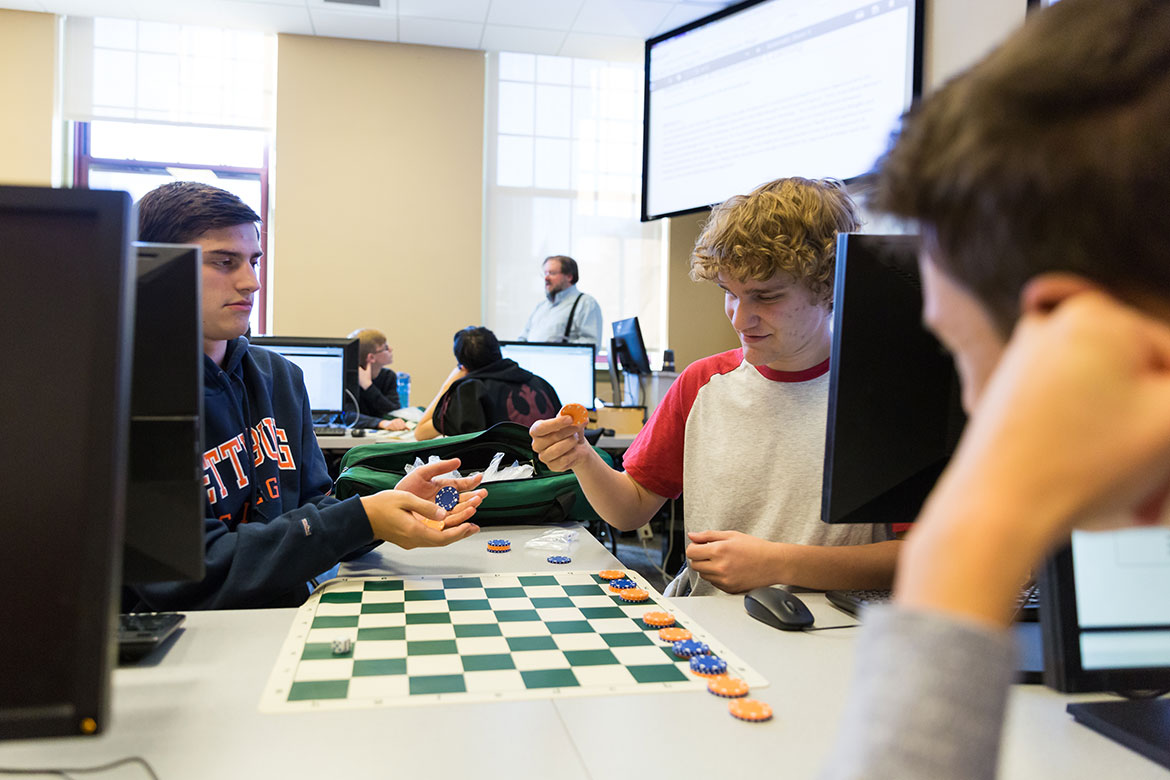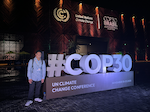

The transition to college can present many challenges and opportunities for growth: moving away from home, living on your own for the first time, and, of course, navigating new academic expectations.
For Gettysburg College students, First-Year Seminars help to aid the academic transition and prepare students for the level of intellectual curiosity and critical thinking required for collegiate-level work.
Not only are they immersive and interdisciplinary, but these seminars also focus on passion projects for many members of our first-class faculty, allowing students to connect with their professors over common interests.
Find out what some of this year’s First-Year Seminars will cover—including cool classroom discussions, field trips, and activities—and how the professors who teach them will introduce students to collegiate-level coursework.
Psst! Secret Clubs, Clandestine Societies, and Conspiracy Theories
Topics covered: QAnon, Pizzagate, fake moon landings, Kennedy's assassination, Freemasonry, NSA, shape-shifting aliens, flat Earth, and the anti-vaccination movement
Highlights: Discussion with a high-ranking Freemason and a member of the Intelligence Community, visit to the Freemason temple in Gettysburg and the International Spy Museum in Washington
German Studies Prof. Henning Wrage: “I believe the topic itself is not particularly unique—it corresponds to a fascination with all things secret that we have probably all shared since we were children. I worked on a similar topic for my research, and it occurred to me that many books of conspiracy theorists look, at first sight, very similar to academic publications. They follow a particular structure, they have an apparatus of footnotes and list the sources they use. Since it is one prominent goal of First-Year Seminars to introduce students to the way we work, I found that it would be both challenging and fun to confront students with both academic and pseudo-academic texts to illustrate the difference.
“Our primary goal is not just to introduce how to work academically, but also to explore the very principles knowledge is based on, to find out what the difference is between a rumor and a fact—and to find out why that difference matters. We will discuss how to explore topics through thinking critically, with an appreciation for all sides of an argument—whether we like it or not.”
Happiness
Topics covered: What is happiness, how can it be quantitatively measured, and what influences happiness
Highlights: Meditation, labyrinth walk, art gallery exhibit, random acts of kindness, and a Garthwait Leadership Center StrengthsQuest exercise
Psychology Prof. Natalie Barlett: “To me, collegiate level of inquiry means critically thinking about ‘big picture’ questions, interpreting research findings and understanding how they apply in the real world, and challenging one’s current assumptions. I challenge my students by having them read and understand empirical research (not a textbook), create their own research projects, and ask their own questions about happiness during this first semester. By showing students that they can meet these expectations from the beginning, my hope is that they are better able to gain the most from their educational experience at Gettysburg College and use their knowledge and skills to continue to ask questions after graduation.
“By the end of the course, students will hopefully leave with the ability to think critically, ask intelligent and important questions, understand the complexities of human well-being, and have the skills to critically assess what does (and does not) impact their personal levels of happiness.”
Are You Smart? Science, Culture, and How We Learn
Topics covered: Neurobiology of learning, science of sleep, effective study habits, time management, and memory anatomy
Highlights: Practicing various study habits rooted in the latest science on effective learning, interviewing recent Gettysburg College alums on the habits and behaviors most effective for them
Health Sciences Prof. Josef Brandauer: “Students arrive at Gettysburg College with many different strengths and areas with great growth potential. Our hope is that students in our First-Year Seminar will work together to accomplish two goals: obtain an understanding of the neurobiology of learning, and adopt habits that are consistent with the latest science on effective learning.”
(En)Countering Narratives: Storytelling, Identity, and Social Change
Topics covered: Storytelling methodologies, complexities of race, class, and gender, and power dimensions through which inequity operates
Highlights: Visiting the Bryan Farm on the Gettysburg battlefield, fieldtrip to the Adams County orchards, conversations with leaders in the immigrant community, and participation in the Storytelling Institute’s #WhoWeAre project
Center for Public Service's Kim Davidson and Jeffrey Rioux: “We created this course as a way to model and inspire community-based learning. The community-based learning component of the course was designed in partnership with the Work-Ready program of the South Central Community Action Program (SCCAP), which offers individuals support to break down barriers to employment. As part of a six-week program called the Storytelling Institute, the students in our class and Work-Ready participants do just that—tell their stories. By doing so we work towards the common goals of building communication skills, improving confidence, developing empathy, enhancing critical thinking skills and developing relationships between people whose racial, economic, or religious background may differ.
“Much of what we know and hear is told by dominant groups, passed on through historical and literary documents and celebrated through public rituals, laws, the arts, education and media representations. We hope that students will think critically about the stories they hear in order to analyze how privilege and oppression operate in their own lives and in the greater world. We then hope they can promote and uncover stories and personal connections to challenge social inequalities.”


